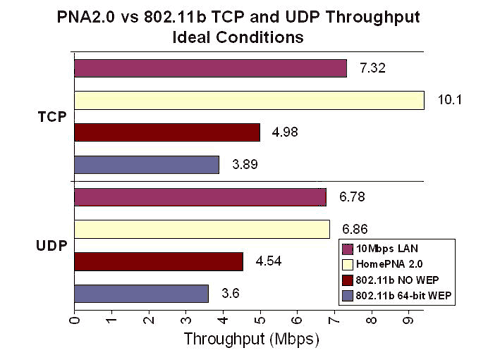Cutting all Cables: Phoneline vs. Wireless Networking
by Eric Hagen on October 30, 2001 4:10 AM EST- Posted in
- IT Computing
Performance - Throughput
The theoretical throughput of our networks varies, however the theoretical number we have discussed do not take into account any transmission overhead. As with any Ethernet-type network, the actual maximum throughput should be somewhere on the order of 50%-80% of the data rate, accounting for overhead and traffic control. Obviously, both the wireless and PNA networks will be much more prone to interference and must operate in a much less friendly environment than the standard Ethernet network running over certified and electrically isolated Category 5 cables. The wireless has the additional difficulty of compensating for signal attenuation over distance, which is much less a factor in wired networks.
Ideal Conditions
Ideal conditions are rare when you are actually using hardware in everyday situations, but looking at the results for these tests can help us understand the strengths and weaknesses of each type of technology.
- Wireless units were placed so that their transmission antennae were aligned and within 3 inches of the receiver. The antennae were shielded from outside interference by a tin housing.
- PNA networks were wired directly together with a 3-foot segment of UTP phone wire.

Under ideal conditions, the performance leader is clear. The PNA network offers significantly higher real-world throughput capability, due to its higher frequency transmission. Of note, our original round of testing utilized the 2wire access point for both HomePNA 2.0 and 802.11b wirelesss tests. However, It was quickly obvious that the 10Mbps Ethernet was the limiting factor in the performance of this setup and we needed to use a peer-to-peer transfer to achieve a valid test-case. Since HomePNA 2.0 networks operate on a peer-to-peer bus anyway, this didn't affect the outcome of the comparison
It is also interesting to note that the WEP encryption does add to the volume of data that must be transmitted and will decrease actual throughput. We did not test a 128-bit encryption system as none of the access points we received had that capability. The 64-bit encryption system is a much more common system and it is very likely that a 128-bit encryption would further slow actual data throughput.










0 Comments
View All Comments